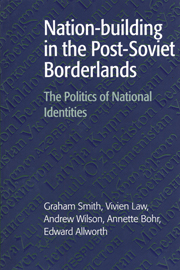Book contents
- Frontmatter
- Contents
- List of figures
- List of tables
- Preface
- The post-Soviet borderland states
- 1 Post-colonialism and borderland identities
- Part I Rediscovering national histories
- 2 National history and national identity in Ukraine and Belarus
- 3 National identity and myths of ethnogenesis in Transcaucasia
- 4 History and group identity in Central Asia
- Part II Ethnopolitics and the construction of group boundaries
- Part III Language and nation-building
- Notes
- Index
2 - National history and national identity in Ukraine and Belarus
Published online by Cambridge University Press: 01 June 2011
- Frontmatter
- Contents
- List of figures
- List of tables
- Preface
- The post-Soviet borderland states
- 1 Post-colonialism and borderland identities
- Part I Rediscovering national histories
- 2 National history and national identity in Ukraine and Belarus
- 3 National identity and myths of ethnogenesis in Transcaucasia
- 4 History and group identity in Central Asia
- Part II Ethnopolitics and the construction of group boundaries
- Part III Language and nation-building
- Notes
- Index
Summary
This chapter seeks to examine the relationship between historiography and the nation as an ‘imagined community’ in Russia's two east Slavic neighbours, Ukraine and Belarus. The focus of the analysis is on the mythic structures of national historiography as a key influence shaping evolving national identities, and on the tug on identities exercised by rival narratives of the past, here classified for convenience's sake as ‘Ukrainophile’/‘Belarusophile’ and ‘Russophile’ or ‘pan-Slavic’. The former have come to the fore since independence in 1991, but Russophile myths have proved powerful and persistent, particularly in Belarus but also amongst the half of the population of Ukraine that is either ethnic Russian or Russian-speaking (see chapter 6). The historical, or historiographical, component of national identities in the region is therefore in transition. The single narrative of the Soviet era has given way not to monolithic new national alternatives, but to a fluid situation characterised by competing myths and dissonant voices. Whereas a potentially strong, if controversial, historiographical mythology is under construction in Ukraine, a key reason for the relative weakness of the Belarusian national movement to date has been its inability to displace hegemonic Russophile myths and anchor a new Belarusian identity firmly in a rival historiography.
Russophile historiography, on the other hand, has so far failed to address seriously the fact of Ukrainian and Belarusian independence, and has remained content to recycle the myths of the tsarist and Soviet eras.
- Type
- Chapter
- Information
- Nation-building in the Post-Soviet BorderlandsThe Politics of National Identities, pp. 23 - 47Publisher: Cambridge University PressPrint publication year: 1998
- 2
- Cited by

